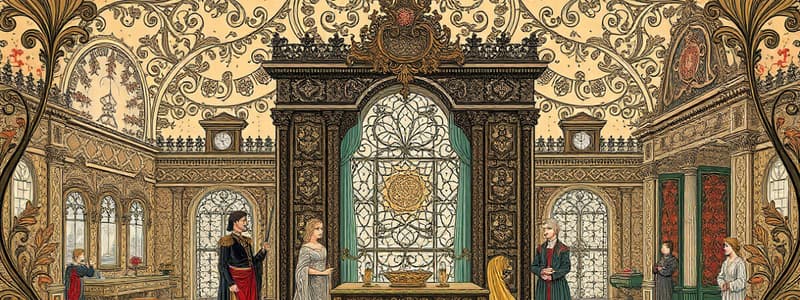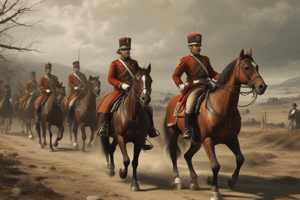Podcast
Questions and Answers
What was the primary objective of the Holy Alliance, prior to its disruption during the Crimean War?
What was the primary objective of the Holy Alliance, prior to its disruption during the Crimean War?
- To maintain a balance of power by ensuring no single nation could dominate the continent militarily or economically.
- To stabilize Europe by suppressing revolutionary movements and maintaining the existing political order. (correct)
- To facilitate economic cooperation between European powers by establishing free trade zones and common currency policies.
- To promote democratic reforms and representative governments across Europe, ensuring stability through popular sovereignty.
Which of the following actions by Napoleon III demonstrated his focus on modernizing France?
Which of the following actions by Napoleon III demonstrated his focus on modernizing France?
- Prioritizing military expansion to establish French dominance over neighboring territories in Europe.
- Implementing strict censorship laws to control public opinion and suppress dissent.
- Investing in infrastructure projects such as railroads and modernizing the capital city of Paris. (correct)
- Focusing exclusively on agricultural development to maintain France's rural traditions and economy.
How did the Crimean War impact Russia's domestic policies?
How did the Crimean War impact Russia's domestic policies?
- It resulted in Russia forming stronger alliances with other European powers to jointly suppress internal dissent.
- It exposed Russia's military and infrastructural weaknesses, prompting Tsar Alexander II to initiate reforms such as freeing the serfs and modernizing the judicial system. (correct)
- It reinforced Tsar Nicholas I's commitment to maintaining the autocratic system without any reforms.
- It led to the immediate establishment of a constitutional monarchy to appease public discontent.
What was Cavour's primary strategy for achieving a unified Italian state?
What was Cavour's primary strategy for achieving a unified Italian state?
What was the significance of Austria's neutrality during the Crimean War, orchestrated by Napoleon III?
What was the significance of Austria's neutrality during the Crimean War, orchestrated by Napoleon III?
Which of the following best describes the 'rubber stamp legislature' established by Napoleon III?
Which of the following best describes the 'rubber stamp legislature' established by Napoleon III?
How did Cavour's economic policies contribute to his unification strategy?
How did Cavour's economic policies contribute to his unification strategy?
What was Napoleon III's intended outcome in the alliance with Cavour against Austria, regarding the Italian peninsula?
What was Napoleon III's intended outcome in the alliance with Cavour against Austria, regarding the Italian peninsula?
What was the primary goal of Garibaldi's campaign in Southern Italy?
What was the primary goal of Garibaldi's campaign in Southern Italy?
Which of the following best describes the core principle of realpolitik?
Which of the following best describes the core principle of realpolitik?
How did Bismarck bypass the Prussian parliament's resistance to King William I's army reforms in 1862?
How did Bismarck bypass the Prussian parliament's resistance to King William I's army reforms in 1862?
What was the central question regarding German unification in the post-1848 era that shaped Bismarck's political strategy?
What was the central question regarding German unification in the post-1848 era that shaped Bismarck's political strategy?
How did Bismarck use the Schleswig-Holstein conflict to advance Prussia's position in Germany?
How did Bismarck use the Schleswig-Holstein conflict to advance Prussia's position in Germany?
Following Prussia's victory over Austria, what was Bismarck's primary advice to King William I regarding the next steps?
Following Prussia's victory over Austria, what was Bismarck's primary advice to King William I regarding the next steps?
What tactic did Bismarck employ to instigate the Franco-Prussian War?
What tactic did Bismarck employ to instigate the Franco-Prussian War?
What concept did Bismarck utilize to foster unity among the German states during the unification process?
What concept did Bismarck utilize to foster unity among the German states during the unification process?
What was the most significant outcome of the Franco-Prussian War?
What was the most significant outcome of the Franco-Prussian War?
Which of the following actions best exemplifies Bismarck's application of realpolitik?
Which of the following actions best exemplifies Bismarck's application of realpolitik?
How did Johanna Putka influence Bismarck's life and career?
How did Johanna Putka influence Bismarck's life and career?
What role did mass media, such as newspapers, play in Bismarck's plan to unite the German states?
What role did mass media, such as newspapers, play in Bismarck's plan to unite the German states?
Which of the following summarizes the long-term impact of Bismarck's political strategies on Germany?
Which of the following summarizes the long-term impact of Bismarck's political strategies on Germany?
Bismarck's provocation of France into declaring war on Prussia demonstrates which aspect of realpolitik?
Bismarck's provocation of France into declaring war on Prussia demonstrates which aspect of realpolitik?
How does the concept of 'negative integration' relate to Bismarck's unification of Germany?
How does the concept of 'negative integration' relate to Bismarck's unification of Germany?
Flashcards
Napoleon III
Napoleon III
Nephew of Napoleon Bonaparte who aimed to modernize France.
Rubber Stamp Legislature
Rubber Stamp Legislature
A legislature designed to approve Napoleon III's decisions.
Crimean War
Crimean War
War involving France, Britain, and the Ottoman Empire against Russia.
Holy Alliance
Holy Alliance
Signup and view all the flashcards
Serfs
Serfs
Signup and view all the flashcards
Cavour
Cavour
Signup and view all the flashcards
Cavour's Alliance
Cavour's Alliance
Signup and view all the flashcards
Post-Crimean War Transformation
Post-Crimean War Transformation
Signup and view all the flashcards
Giuseppe Garibaldi
Giuseppe Garibaldi
Signup and view all the flashcards
Realpolitik
Realpolitik
Signup and view all the flashcards
Realpolitik Defined
Realpolitik Defined
Signup and view all the flashcards
Otto von Bismarck
Otto von Bismarck
Signup and view all the flashcards
Bismarck's Defiance
Bismarck's Defiance
Signup and view all the flashcards
Bismarck's Goal
Bismarck's Goal
Signup and view all the flashcards
Bismarck's Strategy
Bismarck's Strategy
Signup and view all the flashcards
Prussia
Prussia
Signup and view all the flashcards
Schleswig-Holstein Conflict
Schleswig-Holstein Conflict
Signup and view all the flashcards
Consolidating Power
Consolidating Power
Signup and view all the flashcards
The Faked Telegram
The Faked Telegram
Signup and view all the flashcards
Why Provoke War?
Why Provoke War?
Signup and view all the flashcards
Franco-Prussian War
Franco-Prussian War
Signup and view all the flashcards
Negative Integration
Negative Integration
Signup and view all the flashcards
Outcomes of the Franco-Prussian War
Outcomes of the Franco-Prussian War
Signup and view all the flashcards
Study Notes
- Napoleon III strived to be a disruptive nation builder.
- He aimed to create a lavish court and boost the economy.
- He also looked to establish banks, build railroads, and modernize France.
- Napoleon III established a rubber stamp legislature and outlawed worker activism.
The Crimean War
- Napoleon III promoted the Crimean War, during which France, Britain, and the Ottoman Empire fought against Russia.
- Russia was challenging British interests in Asia.
- Napoleon III ensured Austria remained neutral, breaking the Holy Alliance of Russia, Prussia, and Austria.
- Russia's defeat led to internal reforms.
- The Tsar recognized the need to free the serfs, reform the military, and modernize the judicial system.
- The Crimean War disrupted the Holy Alliance.
Russia's Response to Defeat
- Russia's defeat prevented it from suppressing revolutions, unlike in 1848.
- The Tsar freed the serfs, reformed the military, and modernized judicial procedures.
- Serfs were individuals tied to the land with some rights.
- Napoleon III transformed Paris into a modern capital post-Crimean War while Cavour sought to unify Italy.
Modernization of Paris and Italy
- Cavour sought to create a unified Italian state through economic modernization.
- He established steamship companies, experimented in agriculture, and studied modernization projects across Europe.
- As prime minister for the king of Piedmont-Sardinia, Cavour advanced modernization plans and allied with Napoleon III against Austria.
- Piedmont would gain Austrian territory while Napoleon would control central Italy and the Pope would lead an Italian confederation.
- Piedmont provoked Austria into war in 1859 and achieved victories, undermining Napoleon's plans as Italians rallied behind Cavour.
Garibaldi and the Unification of Southern Italy
- In 1860, Guiseppe Garibaldi led a revolutionary movement and captured southern Italy.
- Garibaldi united with Piedmont's forces to expel Austrians and French.
- Italy became a unified kingdom.
Realpolitik and Political Pragmatism
- Realpolitik involves political actions based on practical considerations.
- Realpolitik replaced romantic ideals of national unification with realism in politics.
- It prioritized achieving concrete goals.
Realpolitik and Otto von Bismarck
- Realpolitik focuses on immediate, practical problems and power dynamics.
- Otto von Bismarck was a key figure using realpolitik, playing a pivotal role in creating the modern German empire.
- He came from a well-to-do, landed aristocratic family, known as Junkers.
- Bismarck aimed to become a major player in German and international politics.
- He served as Prussia's delegate to assemblies of the German states and later as an ambassador to Russia and supported Prussian King William I.
Unifying Germany Under Prussian Leadership
- Bismarck favored a unified Germany under the leadership of a king.
- In 1862, when King William I faced resistance, Bismarck bypassed parliament by collecting taxes.
- The key question in the post-1848 era was whether Austria or Prussia would lead the Germans.
- Bismarck's loyalty to King William I was instrumental in promoting Prussia as the dominant power.
- Historians suggest that Bismarck's political moves were a result of his gift for improvisation instead of a grand plan.
- In 1864, he allied with Austria to settle the status of Schleswig and Holstein.
The Schleswig-Holstein Conflict
- Bismarck got Austria to join Prussia in a war against Denmark to resolve the contested rule of Schleswig-Holstein.
- After victory, Prussia administered Schleswig, while Austria got Holstein.
- Prussia and Austria went to war against each other over these provinces two years later.
- The Austro-Prussian War lasted about six weeks due to Prussia's modernized army.
- Bismarck's strategy resulted in Prussia gaining control of Schleswig-Holstein.
Consolidating Power
- Bismarck brought the northern German kingdoms and states into the North German Confederation.
- He aimed to draw in the remaining German states, employing the power of mass media like newspapers.
- Bismarck faked a telegram supposedly from the King of Prussia to Napoleon III of France, containing insults towards the French.
- The goal was to provoke France into declaring war on Prussia to create a common enemy and unite the German states.
- The Prussian people would feel more united as a country, giving them a national identity and a common cause.
Franco-Prussian War
- France declared war on Prussia in August 1870, incited by Bismarck's manipulations.
- Prussia defeated France, capturing Napoleon III and 150,000 soldiers by September 2nd.
- The victory led to the Bavarians and smaller states joining Prussia.
- In January 1871, the German Empire was declared in the Hall of Mirrors at the Versailles Palace.
Negative Integration
- Building a community or nation by finding enemies or targeting certain categories of individuals to be outcasts is negative integration.
- Bismarck used negative integration to unite the German states.
Outcomes of the Franco-Prussian War
- Prussia won the war against France.
- Germany became united under Prussia's rule.
- Bismarck's goal of uniting Germany was achieved through this conflict.
Studying That Suits You
Use AI to generate personalized quizzes and flashcards to suit your learning preferences.




